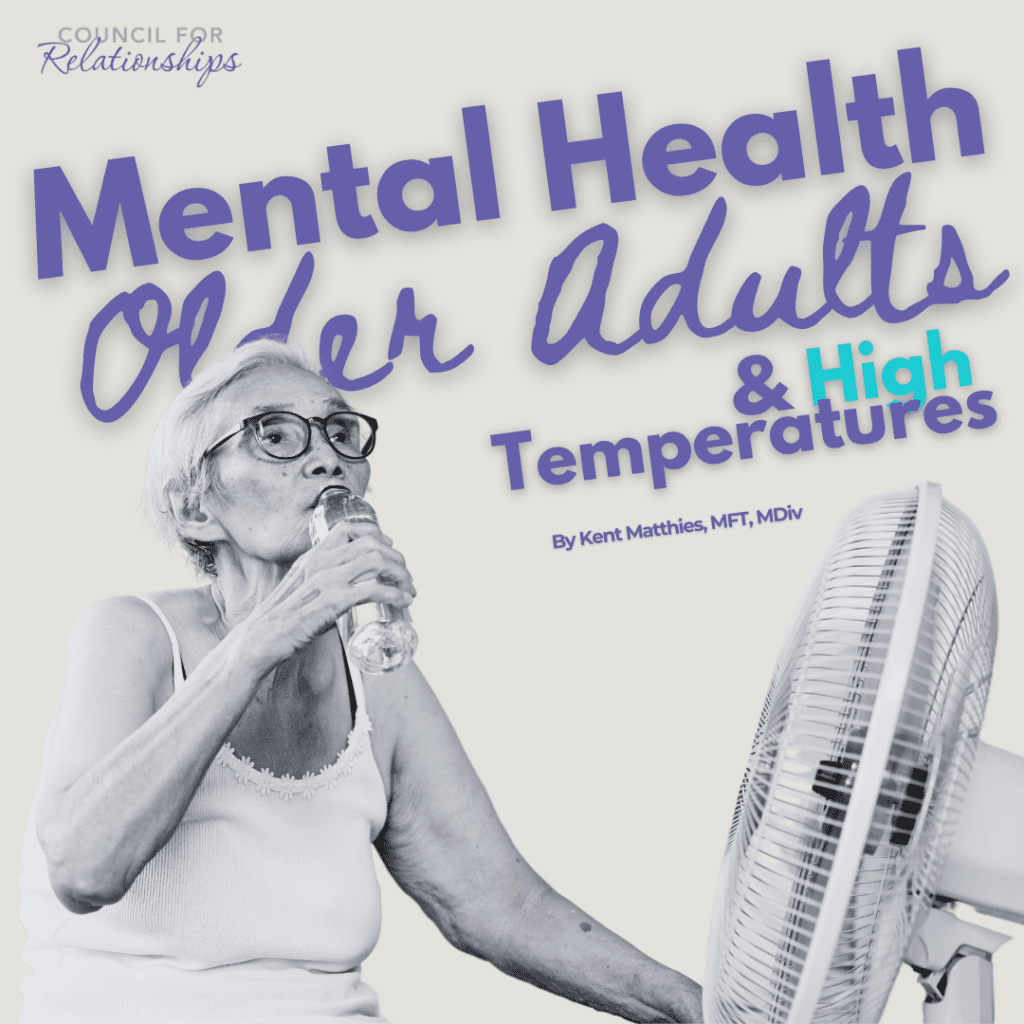Mental Health of Older Adults During High Temperatures
The mental health of older adults during high temperatures is a growing concern, especially as the summer heat intensifies. High temperatures can lead to severe health issues, impacting both physical and mental well-being. In this blog, we’ll discusses the importance of checking in on older adults, particularly during extreme heat.

Request a therapy appointment with Kent Matthies today!
How High Temperatures Impact the Mental Health of Older Adults and Why Checking In Is Important
The summer heat has arrived, and it can be both challenging and hazardous, particularly for older adults. As temperatures rise, it becomes essential to reach out to the elders in your community. Call, text, email, or knock on their door and ask them how they are doing.
High temperatures can cause various health issues. Heat exhaustion can lead to headaches, cramps, nausea, and weakness. Heat stroke, a more severe condition, can cause confusion, seizures, or loss of consciousness.
Older adults are particularly vulnerable to the effects of heat. According to Stephen Dutchen in Harvard Medicine Magazine, “Studies show that it can be hard for even healthy older adults to tell when it’s too hot or if they’re dehydrated. Cognitive decline exacerbates these problems.”
How High Temperatures Affect the Mental Health of Older Adults
Cognitive decline refers to the gradual loss of brain function, affecting memory, thinking, and reasoning skills. Common among older adults, this condition can make it more challenging for them to recognize and respond to heat-related health risks. Cognitive decline significantly impacts the mental health of older adults during high temperatures, making support crucial.
Statistics on Heat-Related Mental Health Impacts for Older Adults
When the temperature climbs, older bodies hold more heat than younger ones. Glands don’t release as much sweat, and the heart doesn’t circulate blood as efficiently, making it harder to release heat from vessels in the skin. Systems from the cardiovascular to the immune struggle to compensate. Statistics highlight the severity of this issue. According to the Centers for Disease Control and Prevention (CDC), older adults are more prone to heat-related illnesses, with those aged 65 and older accounting for 36% of heat-related deaths in the U.S. from 2004 to 2018.
Strategies to Support the Mental Health of Older Adults During Extreme Heat
If they seem open to talking, you can ask more specific questions such as, “Are you drinking enough water? Are you experiencing any heat-related symptoms like headaches? Are you able to sleep comfortably?” This conversation can address the mental health issues and physical challenges they might be facing as a result of extreme heat.
Practical Tips to Prevent Heat-Related Illnesses in Older Adults
If your elderly person’s home is too hot and lacks air conditioning, they may need to go to a cooling center. Many counties can direct people to a nearby cooling center. For example, here is a link to Philadelphia’s cooling centers: Philadelphia’s Cooling Centers.
Remind your elders that without air conditioning, it can be critical to set up indoor fans and use cold washcloths, ice, or spray water on oneself to stay cool. Addressing these practical issues can help mitigate heat-related illnesses and improve the mental health of older adults during high temperatures.
The Importance of Checking In on Older Adults During High Temperatures
Stay Informed with the Older Adults Program
By the way, we want to take this opportunity to ask you: how are you doing with the heat? Register for our OAP newsletter today for more information on supporting the mental health of older adults during high temperatures and staying updated on our new Older Adults Program!
About Council for Relationships
Get Matched with a Therapist
CFR’s team of over 80 therapists and psychiatrists provides expert care in transgender mental health, gender affirming care, and a wide range of mental health needs. Whether you’re seeking individual, couples, family, or sex therapy, our staff is here to help you feel seen, supported, and empowered.
Let us help you find the right therapist today.
Are You Struggling with Your Mental Health?
Are you or an older adult in your life struggling with mental health issues? Let CFR’s over 85 individual, couples, and family therapy experts help you reduce stress and reach your goals. See our Therapist & Psychiatrist Directory for CFR therapists or psychiatrists near you.
If this is an emergency, please call 911 or contact the National Suicide Prevention Lifeline by dialing 988.
More Mental Health Blogs for Older Adults
CFR’s therapists, psychiatrists, and other mental health professionals offer much more to explore! Check out the CFR Expert Voices blog for great mental and emotional health advice, insights, and resources for older adults. To get first access to our Expert Voices blog, join our mailing list!
Caring for an Aging Parent: 3 Tips to Keep You from Losing Yourself
Disenfranchised Grief: How the Passing of My Cat Made Me a Better Therapist
One Two Three Time: A Time Prioritization Strategy for Adults
